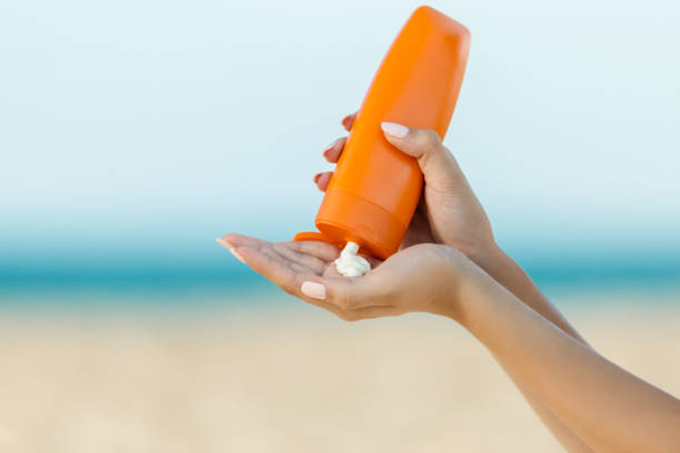
Published on July 1, 2021
Read Time: Four Minutes
Information provided by Ariella Martin, FNP, of Phelps Health, and the Centers for Disease Control and Prevention (CDC).
Summer is a great time to get outdoors and enjoy the weather. However, the summer months also can be tough on your skin.
Ariella Martin, a family nurse practitioner who specializes in family medicine at Phelps Health, shares some tips to keep your skin safe this summer.
How can I avoid bug bites?
Use insect repellent. If wearing sunscreen too, apply the sunscreen first and allow it to dry. Then, apply the insect repellent.
Also, wear appropriate clothing, such as long sleeves, long pants and tall socks, when possible. Certain products, such as Permethrin, can be used to pretreat your clothing to avoid insect bites.
What should I do if a bee or wasp stings me?
First, try to remove the stinger, if possible. Then, wash the area with soap and water. To help with the discomfort, remember the following:
- Apply a cool compress.
- Elevate the part of the body stung to help with any swelling.
- Avoid scratching, if possible.
- Apply over-the-counter hydrocortisone cream to the sting to help with itching and swelling.
Over-the-counter pain medicines, such as acetaminophen (Tylenol) and or ibuprofen (Advil), can help, too.
How can I prevent tick bites?
Stay out of places where ticks are most common, such as grassy, brushy or wooded areas. Animals and pets also can transfer ticks to humans. Use insect repellents and pretreat your clothing.
After coming back from an area where you may have been exposed to ticks, check your clothes, remove them and take a shower. Make sure to check for ticks on your body, including under your arms, around and behind your ears, in your belly button, in and around your hair, and in your waistband area.
If you believe a tick has bitten you, contact your doctor or primary care provider if you have any of these symptoms: fever, chills, headache, fatigue, muscle or joint aches, or a “bulls-eye” rash.
What can I do to stay safe in the sun?
- Stay in the shade, if possible.
- Wear long sleeves and long pants, if possible, to help protect against ultraviolet (UV) rays.
- Wear hats to help shade your face, ears and neck.
- Wear sunglasses to help protect your eyes from UV rays and reduce the risk of cataracts.
- Use a broad-spectrum sunscreen with a sun protection factor (SPF) of 15 or higher. Make sure to check the sunscreen’s expiration date. Reapply sunscreen if you are out in the sun for more than two hours.
These tips also are ways you can reduce your risk of skin cancer.
How can I treat a sunburn?
If you get a sunburn, remember the following advice:
- Apply cool compresses.
- Use lotion or a spray made for treating sunburns. (Some lotions/sprays have aloe or numbing properties to help with the discomfort.)
- Use over-the-counter medications for the pain.
- Stay out of the sun until the redness and pain go down.
What should I do if I am burned by fire?
Cool down the burn site with running, cool water over the area for 20 minutes. Ice or ice water can actually cause more damage. Then, cover the burn with a dry, nonstick, sterile bandage.
During recovery, do not pop the blisters if any form. Bacteria can enter the wound through open blisters and cause an infection. If the burn site is larger than the palm of your hand, seek further evaluation by a healthcare provider.
How can I treat heat rash?
Heat rash, also known as prickly heat, usually resolves by itself. Ways to help with discomfort include the following:
- Move to a cooler, less humid area.
- Avoid scratching the skin to prevent infection.
- Keeping the affected area dry.
- Use over-the-counter creams, such as calamine lotion, or hydrocortisone cream or spray.
- Avoid clothing that is too tight to prevent heat and moisture from being trapped.
How can I get relief from poison ivy, oak and sumac rash?
- Avoid any plants that irritate your skin or cause an allergic reaction.
- Use over-the-counter anti-itch creams and lotions.
- Take antihistamines such as Zyrtec, Claritin or Benadryl.
- Use cool, wet compresses or soak in a cool bath.
- Avoid scratching, if possible.
Want to Learn More?
Do you have questions about skin care? Find a healthcare provider today who can help. Visit our Find a Doctor page.